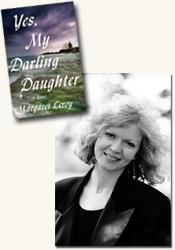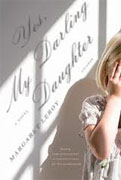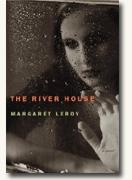author interview
book reviews:
· general fiction
· chick lit/romance
· sci-fi/fantasy
· graphic novels
· nonfiction
· audio books
· author interviews
· children's books @
curledupkids.com
· DVD reviews @
curledupdvd.com
newsletter
win books
buy online
links
home
for authors
& publishiss
for reviewers

|
|||||
 
Margaret Leroy talks with contributing editor Michael Leonard about the unreality of the everyday world, the treacherous gift of advice, and birds on a wire. Interviewer Michael Leonard: This idea of past lives is fascinating. Where did you get the idea for the story? Margaret Leroy: It had been simmering away in my mind for a long time. I saw a television programme years ago about children who seemed to remember past lives, and was enthralled: it seemed an idea so rich in story possibilities. I loved the idea of showing the supernatural seeping into an ordinary life. So Grace lives in an everyday world of familiar things - nursery school, playdates, children's parties - yet becomes aware that something very strange is happening to her daughter. The novel opens with the party at Karen's house, where the world seems at peace for Grace - at least for a time. Sylvie's eruption sets the scene for what is to come. Why was it so important to begin your story with one of Sylvie's outbursts? I sometimes like to begin a story by showing my heroine in the everyday world, where all seems straightforward and normal, and suddenly something shocking happens, revealing just what she will be up against in the story. And I feel Sylvie's outburst quickly establishes the goal of Grace's quest - to find out what's wrong with her daughter. While Karen's life is very different from Grace's, they seem solid friends. Grace is concerned about what Karen could be thinking. Is it Sylvie's behavior that causes this uncomfortable rift between them? What do you think lies at the core of Sylvie's friendship with Karen? Karen is a warm, friendly woman who was immediately drawn to Grace on the maternity ward where they both had their babies. It's a sign of her warmth that she befriends Grace, whose social class and background as so different from her own. It all seems to work out so well because their little daughters become best friends. But then Sylvie's behaviour becomes impossible for Karen to tolerate - and somehow she's no longer able to help or understand Grace. She's an example of a character type that recurs in my writing - the friend who gives the wrong advice. I think advice can be a treacherous gift! Sylvie seems to be "utterly beyond Grace," and she's truly flummoxed at her daughter's sadness and her fear. Grace is obviously grasping at straws. Where does she get her strength from? She gets her strength from her love for her daughter. I think it's in the nature of maternal love that the more needy your child is, the more you love them. So, even though nothing she tries seems to work, she'll never stop trying. You get right to the heart of Grace's dilemma, and there's this real sense that Grace is struggling not just with Sylvie's behavior but with her life, all of this "the patching up and making do." Is Grace based on a real person? No: but I probably put little bits of myself into my main characters. My own younger daughter has been ill for eleven years, and I think I was maybe writing out of that experience - the sense of desperation, the surges of hope, and the loneliness that comes from feeling that nobody knows what it's like for you. But I wasn't consciously aware of using that experience when I was writing Grace: I've only realized how it shaped my writing since finishing the book.
She's quite a lonely person. In the book, I haven't said very much about her childhood, because the part of her backstory that matters for the story is her love affair with Dominic. But I envisage her as having had a difficult and rather lonely childhood: her mother was herself a single parent who always struggled financially and died quite young, leaving Grace isolated and without any other family connections. Grace's flat in Highfields, the red-light district of London, is a vastly different place from Karen's upper-middle class suburb and her bourgeois friends. Why did you choose this area as the setting for Grace and Sylvie's home? I saw Grace living in one of the rather lovely but dilapidated old houses that you often find in the crumbling parts of the inner city in the UK - in areas that have gone seriously down in the world. She loves it for its fading elegance, and for the mulberry tree in the garden. I like the idea that it's her artist's eye rather than something practical that influences her choice. Sylvie constantly seems to be eluding Grace, "like water through her hands. Gently sweeping and trickling away," as she tries to get by in this bitter, comfortless place, always looking behind her, longing for what she can't have. Can you explain this in the light of Grace's dilemma? I think this sense of elusiveness is characteristic of many problems with children - it's certainly been true of my daughter's illness, for instance. As Grace says, "There's nothing to hold on to." Just when you think you've got the measure of things and you know what to do, something shifts and you feel stuck again. Why do you think Grace keeps burning her "crazy half hallucinatory fantasy" for Dominic? Do you think he's threatened by Grace? The scene when she meets him for coffee is born out of her desperation. What does this tell us about her state of mind at this time? Why do you think she reluctantly accepts Dominic's payoff? Like many young women, Grace first falls in love with someone who's a lot older than her, who's self-assured, confident, and an experienced lover. And in her case, maybe the feelings are that much more intense for the reason that Karen outlines - Grace's yearning for the father who walked out on her and her mother. This is why she finds it so hard to let herself be attracted to anyone else. "No other man feels quite real. They're too young, too insubstantial - they don't overwhelm me as he did." She takes his money because she's too hard-up to be able to afford the grand gesture of pushing it back at him. The thick, sweet smells of Lavinia's flower-shop wrap around Grace. Why is her job at Jonah and the Whale and her friendship with Lavinia so important to her? Lavinia is a very perceptive woman who for a while is almost a mother to Grace. She's unlike the other people in Grace's life in that she doesn't offer advice, but tells Grace to trust her own instincts. Lavinia is the one character in the book who was based quite closely on someone I knew, a dear friend of mine who died a number of years ago: writing Lavinia was a way of remembering her. Grace becomes hemmed in on all fronts, first Karen and then the stern-aced Mrs. Pace-Barden; even Doctor Strickland isn't really that much help. Why are the staff at Sylvie's nursery so at a loss to help Grace find a solution to Sylvie's problems? In writing the story, I especially enjoyed showing the collision between the everyday and the supernatural. So all the people around Grace - Mrs. Pace-Barden, Karen and the other mothers, the child psychiatrist - come up with various sensible-sounding theories to explain Sylvie's unhappiness. Yet nothing's going to work, because they're dealing with something uncanny, something other. Mrs. Pace-Barden's behaviour towards Sylvie may seem harsh - but I've heard of cases of four-year-olds being expelled from school, so it can happen!
Grace wants to make a big, extravagant gesture which will somehow wipe out her unhappiness and Sylvie's. I imagine we're all tried this at times: I know I have! Of course, it never works. Once Grace sees the article on ghosts and the idea of someone being spiritually connected to a past life, she realizes there may be hope, however outlandish. Why does she follow this path when everyone around her, especially Karen, dismisses it as just psychic mumbo-jumbo? I guess the worse a problem gets, the more likely we are to entertain outlandish ways of trying to solve it. But Grace is ambivalent - sometimes she believes it, sometimes she doesn't - which I think is characteristic of many people's attitude toward the supernatural. Adam is an interesting character: he's disheveled but kindly, and he proves to be loyal to Grace and Sylvie and also quite noble. Why does Adam connect with Grace so readily? I love Adam - I really fell for him in writing the story! I think Grace and Adam are quite similar in a way - there's something rather lost and lonely about both of them - though this isn't immediately apparent in Adam's case, given his easy manner and high-status job. I feel they see something of themselves in each other. When I looked back at what I'd written, I noticed how Grace only gets to meet Adam after having her tooth extracted - and I thought that was quite interesting. In a way, it's a fairytale trope: she has to give up something of herself before she can meet the person who will show her the way forward. How do you think Adam's history and the accident with his brother influence his attitude toward helping Grace? The things that have happened in Adam's past have forced him to think about death, and about the possibility of an afterlife. There's an openness in him, and a willingness to accept uncertainty. So his approach to Sylvie's troubles is entirely different to that of most of the people in Grace's life. I found the scene at Kwik Save to be pivotal. Here she meets the autistic boy and his harried mother, who is forced to spend her life cleaning up the chaos of her child. Perhaps Grace for the first time realizes she's not alone, and it speaks the language of compassion. How do you think she's changed by this encounter? I think that's absolutely right - this is the point in the story when Grace realizes she's not alone. Afterwards she goes back to her flat and looks out of the window and sees a sparrow clinging to the telephone wire in the wind, and feels afraid for the bird - "as though just for a moment I'm forgetting it can fly." And she realizes in that moment that there is someone who can help her, and she has more choices than she thought. Sylvie is essentially sad, but she also has moments of incredible lucidity and outbursts of happiness. How difficult was it to write of her wayward mood swings? Isn't there something innately appealing about this young protagonist? Actually I found Sylvie very easy to write. She was always there in my head - what she looked like, how she talked. Sometimes she's just a normal, happy, forthright little girl: at other times, she's in the grip of the thing that haunts her, and it's in those moments that she's so disturbed, or turns away from Grace in a way that hurts her mother terribly. I've brought up two daughters, and I think there can be something rather other-worldly - almost spooky - about little girls at times, and I wanted to try and capture that quality. The wintry dark mix of rain and wind that encapsulates much of London, especially in the first part of the novel, is perhaps symptomatic for Grace and Sylvie's own shuttered emotional states. Can you talk to the symbolism of claustrophobic London as juxtaposed with the open and expansive sea and landscapes of Coldharbour? I like there to be an outward progression in a story, as the characters move away from the limitations of the early stages and into a wider world. Here the early scenes are mostly domestic and enclosed, and, yes, there's lots of bad weather: and there's a sense of being trapped, that there's no solution whichever way you turn. When Grace gets to Connemara, she feels that she can breathe again, and that there can be a way forward for her. Though of course this beguiling place is in fact full of danger for her and her daughter.
It was very challenging! But I particularly like a story structure in which the pace really quickens towards the end, and that's what I've tried to do here. Your writing is gorgeous, full of evocative and meticulous detail of your characters' interior and exterior lives. What drives you to explore these lives with such delicate lucidity? I love this question! I do relish that whole process of building a character - exploring their backstory, looking at what has made them who they are, showing all the little decisions through which they reveal themselves. There's a process, which isn't always conscious, of choosing themes and details which feel symbolically right for the story. Here, for instance, one of Grace's psychological tasks is to let go of her obsession with Dominic, and that resonates with what Sylvie has to do: both of them have to let go of the past. You use the city of London as a setting in your novels. What is it about this city that so captures you? I've been lucky to live on the outskirts of London for the past twelve years, and I still find it a thrill just to wander around in central London. It's partly all the beauty and the history, partly the way that everything's mixed up, affluence and poverty side by side. It's also the most cosmopolitan city on earth, which is something to be very proud of! For me, the real substance of Yes, My Darling Daughter It's surprisingly hard to remember how I developed a particular character: Grace feels so real to me now that I can't imagine her not existing! One approach I use is to recall times when I've had similar emotions to my characters, and then to take the feeling one step further. For instance, I might remember being on the maternity ward - all the love and fear for your baby, all the vulnerability - and then imagine how that would feel if like Grace you had no partner and no support. Psychology greatly interests me, and I do have a background as a psychiatric social worker. Maybe that helps! The second half of the book, set in Ireland, is filled with the country's natural beauty. The language of the landscape, the sky and the sea seem to speak to Grace, Sylvie and Adam. What it is about this area that so captures them? I'd decided from early on that Grace's journey would take her to the west coast of Ireland. Maybe for people in Great Britain and Ireland, there's something that draws us to the extreme west - the Celtic bit - when we're conjuring up a setting where the normal rules don't apply, where something very mysterious could happen. But I only went there to research it once I'd written a draft of the book. I chose a little village called Roundstone to be my Coldharbour, and it's an entirely magical place - I think anyone would be enchanted by it. Marcus Paul is a compelling character, perfectly groomed with his patrician air and surrounded by the unhurried activity at Kinvara House. His deceitfulness is perfectly matched to Adam's compassion, and his actions are pivotal in this novel. Where did you get the inspiration for Marcus? There's a type of upper-class English or Irish male - expensively educated, very self-assured - that I can find very attractive, but am also rather wary of! Dominic is rather similar. These are men who know how the world works, whose lives have been smooth and easy, who are automatically respected because of their accents and the way they present themselves. But often, as with Marcus, there's a lot that's hidden.
I hope so. I'm often really horrible to my characters and they will invariably have a tremendous struggle in the course of the story - but I always hope for a happyish-ever-after ending for them! There's a keen sense of the tenuousness of everything in your book as though this life, this world, is flimsy. Can you explain this in the light of the major themes that drive your novel? This may sound a strange thing to say - but I've never felt that the everyday world is quite real: everyday existence has never felt quite as solid to me as it seems to feel to most people. And I've always believed in a spiritual reality, which can break in on our everyday world, as it does in this story. That's one reason why the story theme so appealed to me. Yes, My Darling Daughter As you say, they both have a moral dilemma. Grace's dilemma is about what to believe - once she's made that decision, she knows what action to take - while Ginnie in The River House has to choose between two courses of action, when either action will damage somebody. Yes, My Darling Daughter Are you working on a new novel? If so, would you like to share something of it with us? I'm writing a novel about the war years in the Channel Islands. These are tiny, beautiful islands which are situated just off the coast of France but belong to Britain: they were the only British territory to be occupied by the Germans during World War 2. The story is about a woman bringing up her children under the Nazi Occupation, so here too there will be plenty of enticing scenery and moral dilemmas! I'm just getting to the stage of the book which I really enjoy, when the building blocks of the plot are in place and I can go back and develop my ideas and work on the language. Finally, what do think is the legacy of your books, in particular Yes, My Darling Daughter I think that's for my readers to answer! I write stories about things that fascinate or move me in some way - and I just hope that they will move and fascinate my readers too. Margaret Leroy was born in England and studied music at Oxford. She has worked as a music therapist, teacher, and psychiatric social worker. She is the author of four previous novels. Contributing editor Michael Leonard interviewed author Margaret Leroy, author of Yes, My Darling Daughter (see accompanying review), about her book for curledup.com. Michael Leonard/2009.
|
|||||
| fictionnsf/f · comic books · nonfiction · audio newsletter · free book contest · buy books online review index · links · · authors & publishiss reviewerss |
|
| site by ELBO Computing Resources, Inc. | |




